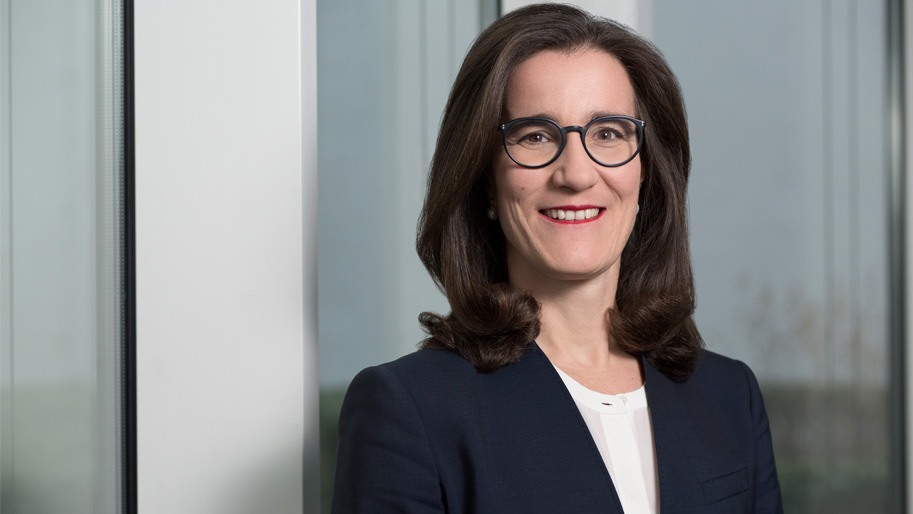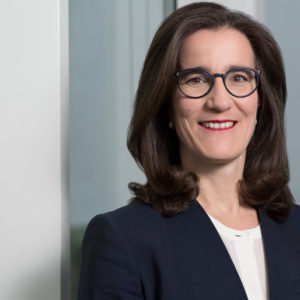Interview with Eveline Metzen

Eveline Y. Metzen is the General Manager of AmCham Germany, a private non-profit business organization with around 2,300 members, making it the largest bilateral trade association in Europe. She was formerly the Managing Board Member of the Atlantik-Bruecke in Berlin and Director of the Amerika Haus Nordrhein-Westfalen in Cologne.
In this interview she discusses tariffs, Germany as an innovation destination, and the importance of transatlantic trade.
DWIH: Some readers might not immediately recognize the need to promote the US as a business partner in Germany. Can you explain to us what it is you do and give us an idea of the American business presence in Germany?
Metzen: In Germany as an exporting country, transatlantic trade directly and indirectly secures millions of jobs. Almost every fourth job in Germany today depends on export. The US is the most important market for German businesses and provides for ideal conditions, but China is quite offensively expanding its Belt and Road Initiative to the West, too. These are some of many reasons why it is essential for us to promote the US as a business partner for Germany.
On the other side of the Atlantic it is equally important to foster the business partnership between Germany and the US. More than 40 million jobs in the US depend on foreign trade. The average US state exports one-fifth of its goods and one-third of its services to the EU. Thus, AmCham Germany strives to enhance global economic and trade relations built on a strong foundation of American and German partnership. We actively support and promote our members’ interests through our global networks in business, politics and AmChams worldwide.
DWIH: Fostering positive business relations between Germany and the US can sometimes be challenging. Can you give us a successful example of AmCham Germany’s work and influence on transatlantic relations?
Metzen: Our work has impact on transatlantic business relations in various aspects. Our policy committees, for example, in which our member companies are actively involved, promote the interests of the companies by meeting with German law makers and government officials. We also do top-level meetings and talk to ministers and publish position papers to react to pressing political topics and legislative initiatives, like the digital tax. We are currently working on a position on the national industrial strategy for Germany which was recently published by the Federal Minister of Economics, to give you one concrete example. We are aiming to be included in the consultation process and will represent our members’ interests. We also make the voice of our members heard in Washington, DC and in the various states of the US, the latter by talking to US governors on a regular basis. We are the go-to organization in Germany for delegations from the US, be it from Congress or the Department of Commerce. We spread our views through different channels to reach a broad audience and be part of debates.
DWIH: How can AmCham Germany function as a mediator between Germany and the US when facing potential trade disputes such as recently discussed tariffs?
Metzen: Currently, Germany’s economic success is under a lot of pressure which is partly caused by the US administration’s trade policy and the uncertainty that it creates. Further escalation between the EU and the US would be detrimental for both economies. That is why we make a point in engaging in a constructive dialogue between American and German stakeholders. We offer a platform for confidential exchange, like a discussion between Members of US Congress and German business leaders at the Munich Security Conference, or by taking delegations (political and business leaders). Moreover, we are not getting tired of advocating for free and rule-based trade between the US and the EU on all communication channels. We make sure to address the broad public too and include German and American politicians, businesses, think tanks and other organizations in our activities.
DWIH: When talking to an American CEO or a startup founder-to-be, what do you tell them? Why is Germany an attractive destination for business and innovation?
Metzen: AmCham Germany has offices in Berlin and Frankfurt, but we also include the rest of Germany in our activities through our twelve regional chapters; thus, we have a geographically broad outreach and a very good overview of the different economic regions in Germany, and each of them has its own advantages. In general, Germany has a strength in engineering, has a first-rate industrial base and the German Mittelstand (small and medium size businesses) are world leaders in highly specialized products. The co-operation of German sme’s and US tech companies is generating innovative industrial solutions. On top of this, Germany offers a good infrastructure and companies benefit from the highly trained workforce. We also shouldn’t forget that Germany is the economic engine in Europe. Germany is the fourth largest economy and offers a large domestic market and easy access to other markets within the EU.

"Germany is Europe’s number one location for research and engineering. German R&D is also supported with billions of euros by federal funds and we have a network of outstanding research institutions like Fraunhofer and Max-Planck."Eveline Metzen
DWIH: As a transnational institution you likely have a unique perspective on both the American and German business landscapes. When thinking of innovation—a major focus of ours—what is a primary difference you see between the US and Germany?
Metzen: From my point of view, both Germany and the US can benefit from each other when it comes to innovation. On the one hand, the US stands out with its entrepreneurial mindset, its advanced digital know-how and venture capital. We especially see that in Silicon Valley, and many startups in Germany would wish for these conditions.
On the other hand, Germany is Europe’s number one location for research and engineering. Germany has a long history of engineering and is known for its tradition of being the land of inventors. German R&D is also supported with billions of euros by federal funds, and we have a network of outstanding research institutions like Fraunhofer and Max-Planck. These different strengths combined make Germany and the US stronger and lead to prosperity in both countries.
